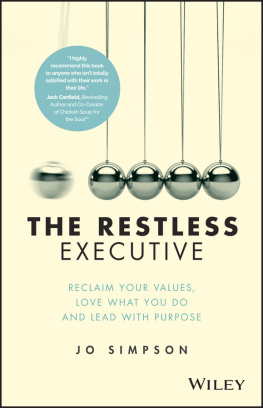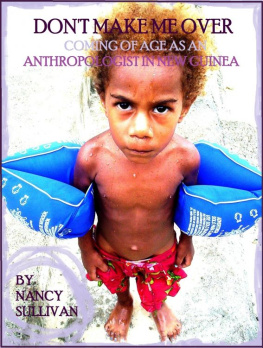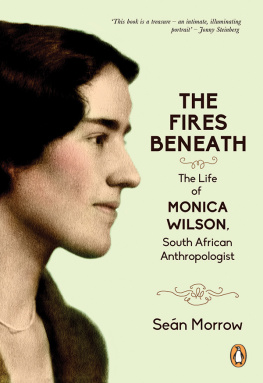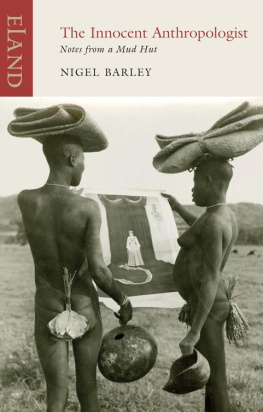Alma Gottlieb has conducted long-term fieldwork with the Beng in Cte dIvoire and more recently with diasporic Cape Verdeans. She is the author or editor of, among other works, The Afterlife Is Where We Come From: The Culture of Infancy in West Africa; A World of Babies: Imagined Childcare Guides for Seven Societies (with Judy DeLoache); Blood Magic: The Anthropology of Menstruation (with Thomas Buckley); and (with Philip Graham) Parallel Worlds: An Anthropologist and a Writer Encounter Africa and Braided Worlds. She teaches anthropology, gender and womens studies, and African studies at the University of Illinois at Urbana-Champaign.
The University of Chicago Press, Chicago 60637
The University of Chicago Press, Ltd., London
2012 by Alma Gottlieb
All rights reserved. Published 2012.
Printed in the United States of America
| 21 20 19 18 17 16 15 14 13 12 | 12345 |
ISBN-13: 978-0-226-30489-2 (cloth)
ISBN-13: 978-0-226-30490-8 (paper)
ISBN-10: 0-226-30489-2 (cloth)
ISBN-10: 0-226-30490-6 (paper)
ISBN-13: 978-0-226-30497-7 (e-book)
Library of Congress Cataloging-in-Publication Data
Gottlieb, Alma.
The restless anthropologist : new fieldsites, new visions / edited by Alma Gottlieb.
p. cm.
Includes bibliographical references and index.
ISBN-13: 978-0-226-30489-2 (hardcover : alkaline paper)
ISBN-13: 978-0-226-30490-8 (paperback : alkaline paper)
ISBN-10: 0-226-30489-2 (hardcover : alkaline paper)
ISBN-10: 0-226-30490-6 (paperback : alkaline paper)
1. AnthropologistsAttitudes. 2. AnthropologyFieldwork. I. Title.
GN20.G68 2012
301dc23
2011034665

This paper meets the requirements of ANSI/NISO Z39.48-1992 (Permanence of Paper).
The Restless Anthropologist
NEW FIELDSITES, NEW VISIONS
Edited by Alma Gottlieb
The University of Chicago Press
CHICAGO & LONDON
Should I stay or should I go now?
If I go there will be trouble
And if I stay it will be double
So you gotta let me know
Should I stay or should I go?
THE CLASH
[Fieldwork is] the central ritual of the tribe [of anthropologists].
GEORGE STOCKING
C ONTENTS
Alma Gottlieb
Virginia R. Dominguez
Gustavo Lins Ribeiro
Maria Lepowsky
Alma Gottlieb
Michael Herzfeld
Linda J. Seligmann
Edward M. Bruner
Paul Stoller
I NTRODUCTION
The Challengesand Pleasuresof Switching Fieldsites
Alma Gottlieb
I always assumed that, as with spouses, cultural anthropologists chose their fieldsites for life. Boas and the Kwakiutl... Malinowski and the Trobriands... Fortes and the Tallensi... Geertz and the Balinese.... These classic professional pairings are seared into our disciplinary consciousness, our own James-Joyce-in-Dublin couplings of person and place.
Of course, as with marriages, one sometimes hears of separations. Even Malinowskis work with the Trobrianders followed (brief) engagements with two other Melanesian groups (the Motu and Mailu), and Geertz, after his famous stint in Indonesia, pulled up stakes to start all over again in Morocco. Nevertheless, the ideal, I somehow accepted for years, is for anthropologists to remain monogamously partnered with their first field community forever. This stubbornly persistent scenario I have come to think of as the One Scholar/One Fieldsite modela corollary of the my village or my tribe mentality to which at least some long-term fieldworkers still feel wedded.
When I last carried out fieldwork in a small Beng village in the rain forest in Cte dIvoire in summer 1993, I began having doubts about the One Scholar/One Fieldsite model. But I struggled for over a decade to identify a new research project in a new geocultural space (see In reflecting on the obstaclesboth internal and externalto making such a change, I encountered few published discussions of the pros and cons of sticking with a first fieldsite versus choosing a new one.
Given the current interpretive turn in cultural anthropology, which has inspired many to reflect critically on the discipline (from fieldwork and writing practices to the politics of both academic and nonacademic workplaces), it is all the more striking that we have not yet addressed the career trajectory issues that face us as we move through our own personal and professional life cycles. Although some anthropologists have begun analyzing aging as a culturally shaped experience when it comes to other peoples lives (e.g., Cohen 1998; McConatha and Stoller 2006; Newman 2003), and more recently some have addressed middle age and other cultural fictions (Shweder 1998; cf. Brandes 1985), we have not yet applied this developing perspective to ourselves.
Frustrated by the relative disciplinary silence that greeted me as I asked myself (perhaps, unconsciously), Should I stay or should I go?and goading myself to confront my own doubts and hesitationsI organized a conference session with that question as its title. Seeking inspirational role models, I recruited colleagues who had made significant changes in fieldsitethoughtful scholars with much to say about their decisions, and strong writing skills to articulate their decision-making processes. Whether moving from North Dakota to North Sumatra (Edward Bruner), or from the Pacific island of Vanatinai to the Pacific coastline of California (Maria Lepowsky), our authors have all found professional inspiration in new geocultural spaces, and have harnessed their analytic insights to reflect on the issues they confronted in so doing. This book represents an expansion of the conversations we began during that meeting.
*
By no means do cultural anthropologists have a monopoly on midcareer research shifts. Yet the fieldwork-based methods that distinguish our research from that of many other academic disciplines present particular challenges. Locating projects in a new area often requires learning one or more new languages precisely at a time when many anthropologists find themselves ensconced in increasingly challenging family relationships (especially, caring for children, aging parents, or both) as well as greater disciplinary obligations (especially, administrative responsibilities both on and off ones own campus). While midcareer scholars who choose new historical eras to explore, or authors to read, or galaxies to study, surely face challenges, the necessity of becoming competent in a new language in midlife is daunting in particular ways. the emotionally engulfing choice of fieldsite that marks the life of an anthropologist produces a deep feeling of regret when one leavesa regret that is probably not experienced by scholars in other disciplines. The uniqueness of our disciplinary challenges suggests the need for special attention to be paid to our career trajectories. The essays assembled in this volume constitute a first step in that direction.
While the primary audience for this collection is thus anthropologists themselves, we also hope that our career narratives will provide food for thought for scholars in other disciplines. There is nothing like being confronted with alien practices to shine a bright light on ones own. Contemplating the challenges and rewards that face midcareer cultural anthropologists in conducting research in new fieldsites may inspire scholars in other disciplines to consider the challenges and rewards of switching research projects in their own disciplines across a long career.







 This paper meets the requirements of ANSI/NISO Z39.48-1992 (Permanence of Paper).
This paper meets the requirements of ANSI/NISO Z39.48-1992 (Permanence of Paper).